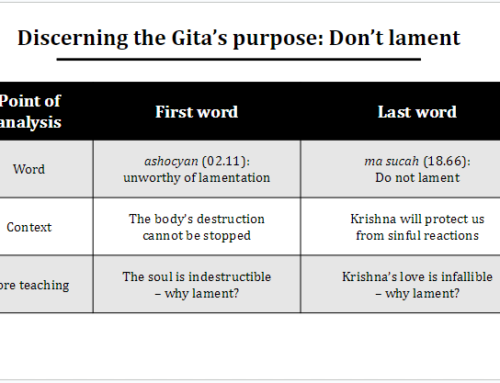Is life a doomed journey from a station called birth to a station called death with a bit of pleasure and a lot of pain sprinkled between?
We may have never thought of our own lives in such stark terms. But this is the unvarnished reality of life at the material level, isn’t it? Then, why don’t we realize it? Because today’s materialistic culture specializes in covering reality with countless varnishes through television, movies, amusement parks and gaudy gadgets that infatuate us with fantasies about worldly enjoyment.
However, these varnishes can’t change the reality that all our struggles to lay our hands on worldly enjoyment will be rendered futile when death lays its hands on us. When reminded of our inevitable mortality, we feel overwhelmed by a haunting sense of existential despair: “Am I meant for casual destruction by a bug or a bang?”
Gita wisdom liberates us from this despair. Right at the start of its profound message, the Bhagavad-gita (02.11-02.30) logically and philosophically establishes that we are souls, eternal and indestructible. This message expands our conception of life dramatically and majestically:
Dramatically because we understand that the bodily pleasures and pains that excite or agitate us so much are inconsequential in the light of the reality that we have had many such bodies; that we as souls are forever secure, beyond all bodily upheavals.
Majestically because we understand that we can reorient our desires from matter to Krishna, thereby attaining a majestic destination: eternal life of love with Krishna in his supreme abode.
This vision reveals that death is not the end of our existence; it is not an inescapable defeat; and it is not worth lamenting over, as the Bhagavad-gita (02.11) indicates.
Bhagavad Gita Chapter 02 Text 11
“The Supreme Personality of Godhead said: While speaking learned words, you are mourning for what is not worthy of grief. Those who are wise lament neither for the living nor for the dead.”


Leave A Comment